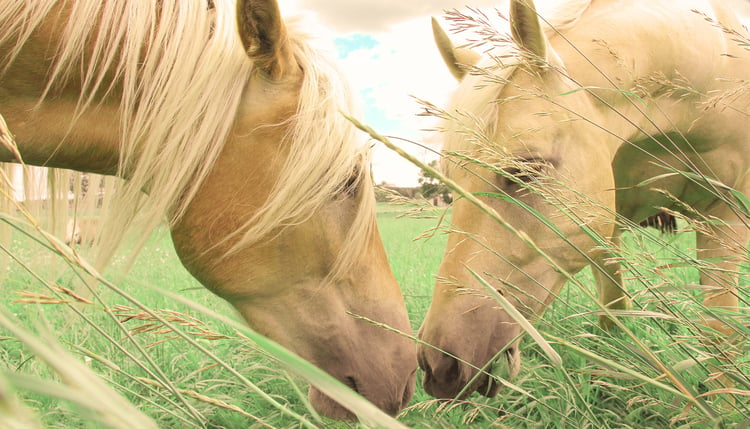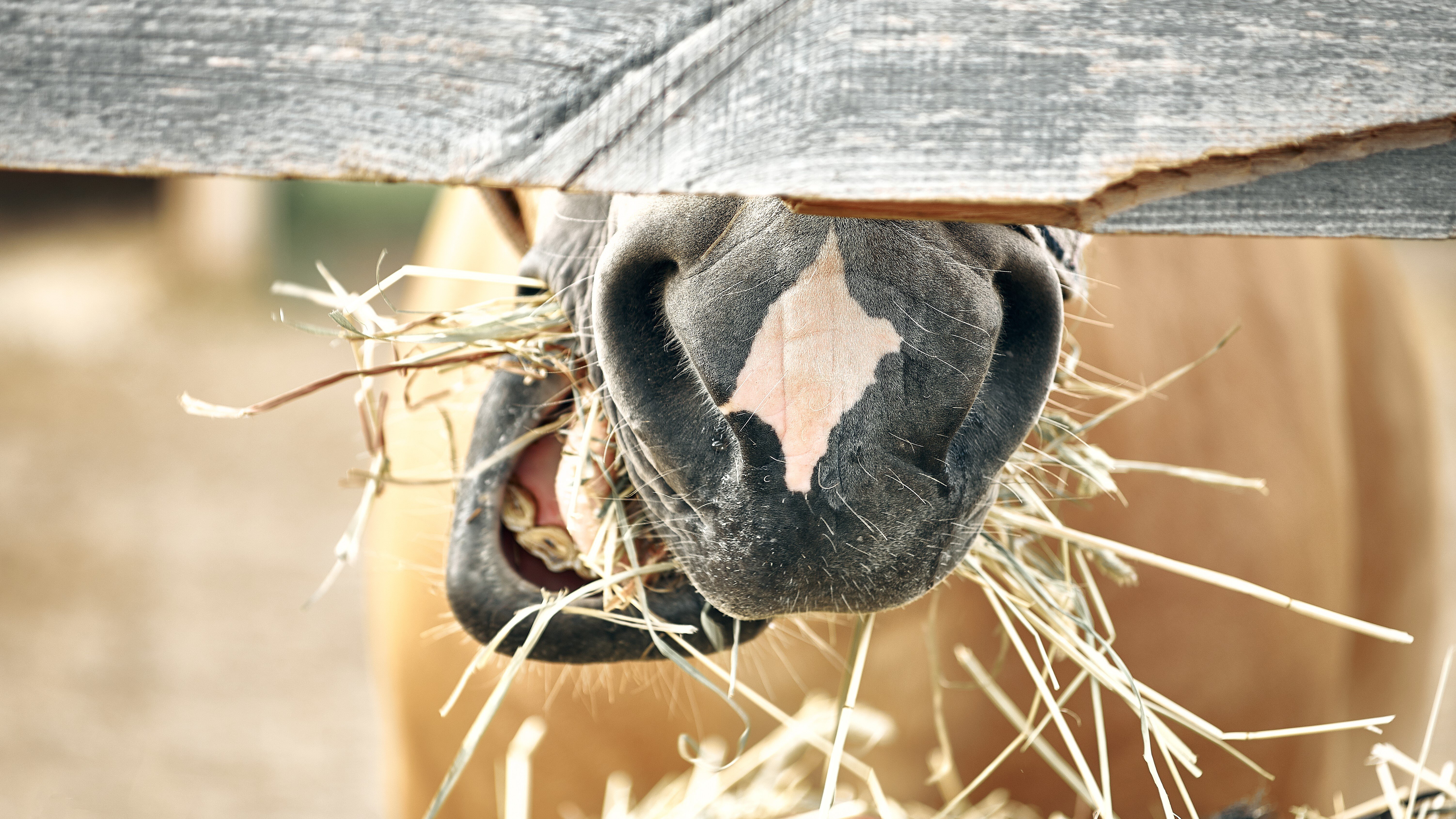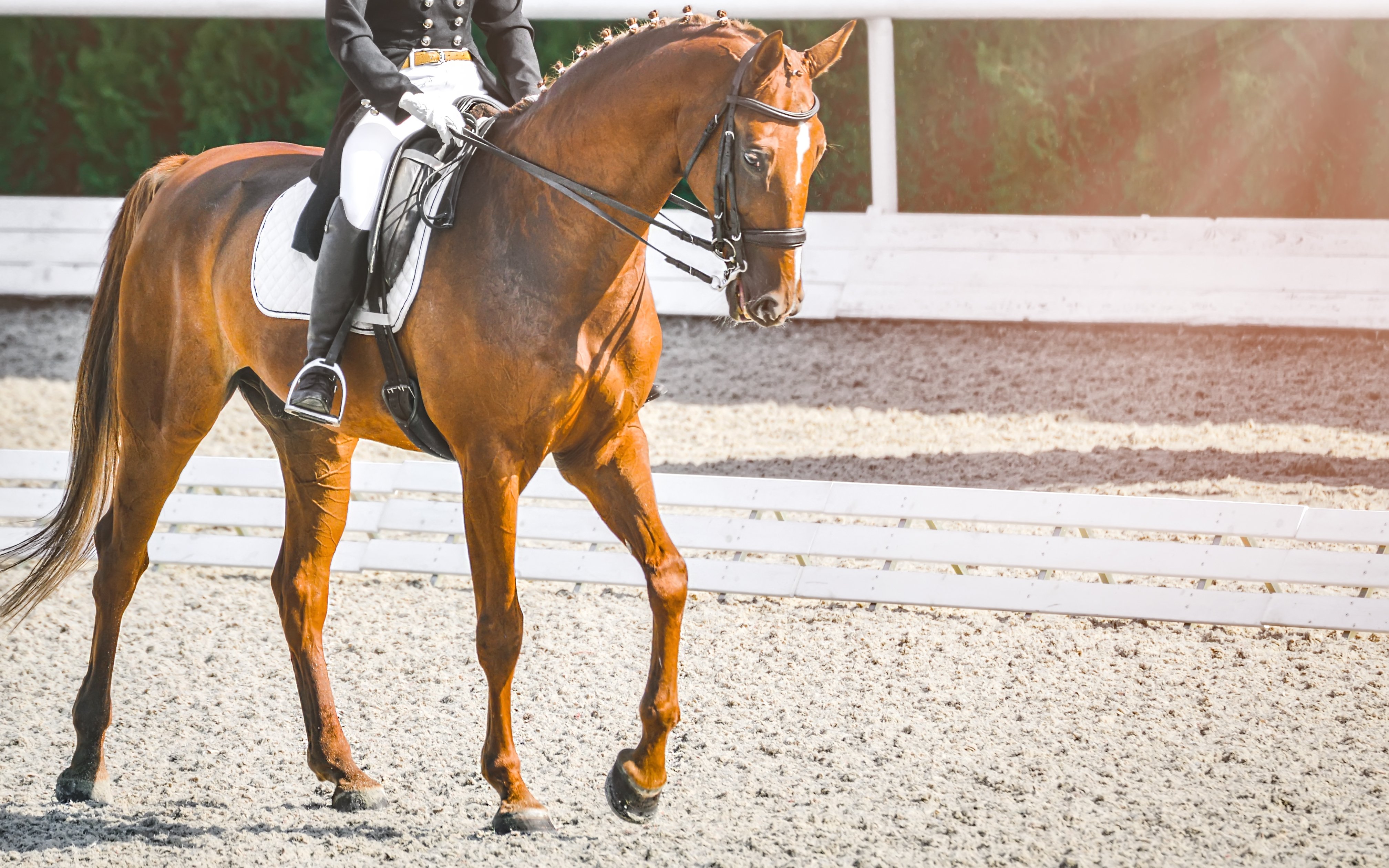How to Treat and Prevent Gas Colic in Horses
May 25, 2023
How to Treat and Prevent Gas Colic in Horses
Juliet M. Getty, Ph.D., of Getty Equine Nutrition, is an independent equine nutritionist offering nutrition services for all life stages and integrative support for disorders and diseases. In this article, Dr. Getty discusses gas colic in horses and how it can be prevented.
Gas colic in horses is the least serious form of colic. That’s the good news. The bad news is it’s very common—so common, in fact, that it's often overlooked as “just gas” like you might get when you eat too much pizza.
You should never be complacent about gas colic, because it can lead to complications such as displacement or twisting of the large colon.[i] Truth is, if you’re feeding correctly, gas colic should not happen. And if it does, you’re likely doing something wrong.
What is Gassy Colic?
The fibrous portion of plants doesn’t get digested until it reaches the hindgut (cecum and large colon), where it's broken down by the resident microbial population. This process, known as fermentation, produces volatile fatty acids to be used for energy, as well as gas.
Gas production is normal. In fact, a horse with sufficient forage will often develop a “hay belly.” This isn't fat, but rather evidence of healthy gas production. Horses produce tremendous amounts of gas, and if the gas doesn’t adequately pass through the large colon, with all its twists and turns, it can build up. That causes abdominal pain, and there you have it—horse gas colic.
Why Does a Horse Get Gassy?
The exact reason for gassy colic in horses is difficult to assess, especially since most forms of colic involve some gas accumulation. But in general, gas colic can be caused by:
- Inadequate forage consumption
- Stall confinement
- Stress
- Ulcers
- Intestinal inflammation
- Inadequate exercise
- Dehydration
- Changing forage sources too quickly
- Introducing new feeds too quickly
The Top 3 Causes of Gas Colic in Horses
Limiting forage, too much stall confinement, and stress are the three most common sources of horse gas colic from the list above. Let's explore them in more detail.
1. Limiting Forage Disrupts Digestion
Horses require forage to be available 24 hours a day, all day and all night. Not that they actually eat during the entire 24 hours, but rather to simulate a natural environment where they can graze on forages as they wish.
If this basic, foundational instinct is not met, the horse releases hormones which can create muscular spasms and interfere with the normal functioning of the digestive tract.
On top of that, hormones become out of balance, leading to inflammation of the hypothalamus, insulin resistance, and obesity. (While this is not the focus of this article, I encourage you to read more about it.)[ii]
When there is insufficient forage, the horse's stomach accumulates acid, creating pain and mental discomfort. When the hay finally arrives, the horse will gorge himself, eating quickly and every bit in sight. He won’t chew as well, resulting in large amounts of undigested feed reaching the microbial population, resulting in excessive gas production.
Forage restriction also leads to ulcers in horses anywhere along the gastrointestinal tract. Consequently, gas production increases because ulcers can interfere with digestion, allowing more undigested feed to reach the hindgut. Since ulcers can also bleed, blood flow to the large colon is diminished, inhibiting normal hindgut motility.
Quick Tip: When horses know that forage is always available, they slow down their eating, take time for a nap or socializing, and come back for more when they are ready. This eliminates many horse digestive problems.
2. Confining Your Horse to a Stall or Small Run/Paddock Reduces Hindgut Motility
When motility slows, gas cannot be expelled. The large colon is made of muscles which contract and relax in a peristaltic motion, moving digested material and waste products, including gas, along its length. When these muscles become “flabby,” movement becomes sluggish, leading to intestinal distress (colic). Gas accumulates, the intestine distends and pain-sensitive receptors in the large colon are stimulated, causing your horse to experience intense pain.
Quick TIp: Blood circulation to the digestive tract is improved by moving around. Simply grazing in the pasture and looking for the next tasty morsel will add up of over the course of the day to more exercise than giving a horse an hour working in the arena. Standing for hours in a small space is very damaging to your horse’s digestive health.
3. And Then There’s Stress
There are literally thousands of studies showing the negative impact of stress on people’s health. Everything from irritable bowel syndrome, to heart disease, to autoimmune diseases, to obesity is impacted by constantly barraging our tissues with stress hormones, leading to a cascade of events that results in poor health. At the cellular level, the exact same thing is true for horses.
Stress exacerbates inflammation, which can damage any part of the body, but when the digestive tract is affected, the risk of colic goes up. Inflammation leads to ulcers, malabsorption, water imbalance, visceral fat accumulation surrounding the intestines, and microbial flora changes, all creating a scenario for colic.
Quick Tip: Pasture turn-out is the best way to reduce stress. Even a few hours each day will have a positive impact. If there isn’t pasture available, turn-out in an outdoor exercise area such as an arena (making sure there’s hay and water available) will reduce gas colic risk.

Remedies for Gas Colic in Horses
With more knowledge and a few changes in your horse's diet and environment, you can help prevent and decrease the occurrence of horse gas colic. Here are five suggestions to consider.
1. Feed Changes Need to Be Slow
The hindgut microbial population must have time to adjust to any new food, so make sure to give your horse’s digestive tract time to make the transition. If you have to change hay every few weeks, an abrupt change of feed will put your horse at risk.
Instead, do a little advanced planning and set aside a few bales of old hay, while slowly switching over to the new hay. You may find yourself regularly blending old and new hays since it is best to take approximately one week to make the adjustment. While doing this, offer your horse a prebiotic containing bacterial fermentation products to help adjust to a new forage source.[iii]
If you’re adding a commercially fortified feed to your horse’s diet to meet additional energy demands, make sure he already has some hay in his belly before feeding a concentrated meal. If you need to introduce a new product, take two to three weeks to safely change to a new feed.
2. Beware of Weekly Bran Mashes
A bran mash, or any new feed for that matter, if unfamiliar to the hindgut microbial population, can trigger a dangerous colic attack. If you want to feed a warm bran mash, consistency is key: It must be fed every day, not once a week. Be sure to introduce it gradually. And since bran is very high in phosphorus, choose a commercially fortified version that has added calcium.
3. Incorporate Horse Digestive Supplements
In addition to a forage foundation, there are several equine supplements worth considering to improve gut health in horses.
- B vitamins offer support for the digestive tract lining, as well as reducing stress. I recommend adding them to your horse’s diet prior to traveling or performing.[iv]
- Yeast – both live yeast and yeast culture-- protects the immune system by keeping the hindgut bacteria in good health.[v]
- Colostrum has the ability to heal ulcers, protect against the damaging impact of NSAIDs, and increase healthy cell proliferation. It also heals leaky gut caused by cecal acidosis and excess fermentation of carbohydrates.[vi]
4. Consider Clean Feeding
You are likely familiar with the movement to change your diet to “clean eating.” This simply means reducing the amount of junk food in your life and replacing it with whole, natural foods clear of pesticides, preservatives, and inflammatory ingredients.
In the horse world, there are two ingredients that we typically feed that are highly inflammatory: sugar and soy products. Most commercially fortified feeds contain both of these. Since these feeds often contain preservatives as well, fed over time they can have a major impact on your horse’s overall health.
5. A Slow Feeder May Be the Answer
Slow feeder nets and containers are designed to simulate grazing.[vii] They must be kept full or you’ll defeat your purpose. When your horse knows that he will always have access to forage, he becomes calm and relaxed, rests more often, and walks away from the hay, knowing it will still be there when he returns. In other words, slow feeders help your horse “self-regulate” and eat only what it needs to maintain a healthy body condition. [viii]
Final Thoughts: The Most Important Change to Improve Gas Colic
My goal in writing this article is to set a high standard for all of us to strive toward. That being said, colic is rare among horses who graze on large pastures, simply because of their easy lifestyle and consumption of fresh, nutritious grasses. Still, I am vividly aware that many, if not most of you, rely on boarding facilities and are not able to offer your horse acres of pasture. But once we know where we want to go, we are better able to get there.
So change what you can, because every little improvement has an impact. The most important thing you can do is:
- Look into possible ways to increase outdoor grazing time. You may need to consider changing barns. Or perhaps your facility offers limited pasture turnout.
- Consider using slow feeder systems in a stall at night so there is hay left over in the morning.
In other words, the most significant change you should strive toward is how to make hay available 24 hours a day.[ix] Remember, your horse is a grazing animal, requiring a steady flow of forage at all times. Feed him, simply, like a horse!
Take control of your horse’s environment and feeding by focusing on nature's rules to avoid gas colic. Every little improvement makes a difference for your horse and other horse owners boarding at the same location. You might just become a trailblazer!
— Dr. Juliet Getty

Daily Gold Stress Relief—A Natural and Effective Supplement for Gassy Horses
Redmond Daily Gold Stress Relief is a natural bentonite clay supplement that provides gentle gut support for horses. It buffers excess acid, binds toxins, improves digestion, helps relieve gas buildup, and resolves diarrhea in horses.
Try a sample pack of Daily Gold and begin improving your horse's digestion today. Use the code "enjoytheride" at checkout to get 50% off your first sample pack order!
Learn More
- Read Alissa's testimonial of how she treated horse gas colic using Daily Gold.
- Some horses eat dirt to relieve digestive pain. Learn more about why they do it and how to resolve it.
Sources:
[i] For more detailed information about colic, its forms, prevention, and what to do, please read the section on colic in Chapter 14 – Digestive Problems, of Feed Your Horse Like A Horse, http://feedyourhorselikeahorse.com
[ii] For information regarding the need for free choice forage feeding and its impact on obesity, laminitis, and leptin resistance, please see articles in Dr. Juliet Getty’s Library, at www.gettyequinenutrition.com
[iii] Ration Plus is an excellent prebiotic to use when changing forage (and other feed) sources.
[iv] BPlex offers all 8 B vitamins, without added iron: http://gettyequinenutrition.biz/products/bplex.htm
[v] Yeast Plus offers both live Saccharomyces cerevisiae and yeast culture: http://gettyequinenutrition.biz/products/yeastplus.htm
[vi] Colostrum from Forefront equine is of high quality: http://gettyequinenutrition.biz/products/forecolostrum.htm
[vii] Getty, J.M. 2014. The correct way to use slow feeders. http://gettyequinenutrition.biz/Library/Thecorrectwaytouseslowfeeders.htm
[viii] Dr. Getty recommends several slow feeders, available at Dr. Getty’s Free Shipping Supplement Store. http://horsesupplements.gettyequinenutrition.biz/slowfeeders.html
[ix] Many horse owners fear weight gain with free-choice forage. Ironically, restricting forage keeps horses overweight. Read my in Dr. Getty’s Library under “Overweight Horses” at www.gettyequinenutrition.com
© Redmond Equine 2023. All rights reserved.
Related posts

How to Naturally Improve Your Horse's Gut Health
Learn about the digestive system of a horse, how to improve horse gut health, and the best ulcer and gut supplement for horses to elevate basic...
December 27, 2024

The Remedy for My Horse's Gas Colic | A Redmond Story
Sarah's horse experienced frequent episodes of serious colic and digestive trouble. Learn how Daily Gold helped her horse's symptoms improve long...



